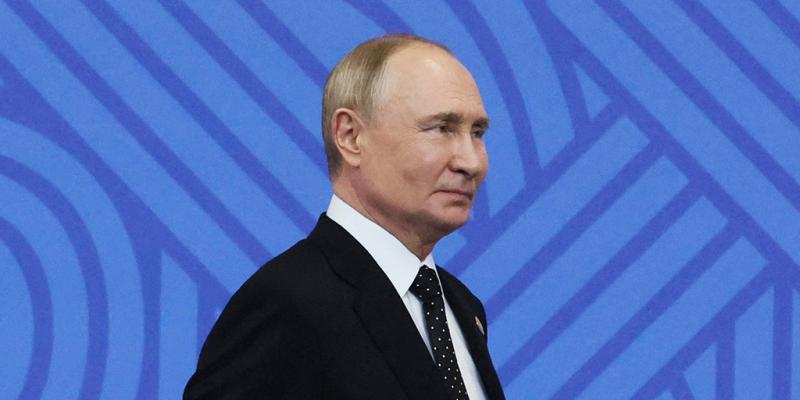Kim Jong Un sending soldiers to Russia complicates Putin's BRICS summit
Category: News & Politics
Via: perrie-halpern • 6 months ago • 6 commentsBy: Keir Simmons and Natasha Lebedeva



Oct. 24, 2024, 10:49 AM UTC / Updated Oct. 24, 2024, 4:57 PM UTCBy Keir Simmons and Natasha Lebedeva
KAZAN, Russia — Once again the reality of war may be dictating the direction of global politics.
This week Russian President Vladimir Putin stood on a stage with Chinese President Xi Jinping and Iranian President Masoud Pezeshkian. The war in Ukraine has brought Putin closer to both countries and more dependent on them. Without the support of Iran, and particularly China, Russia would be faring far worse on the battlefield.
But another world leader has become crucial to the Kremlin — a development that has loomed over Putin's effort here to project himself as a global leader untarnished by Western backlash over the war.
North Korea's Kim Jong Un is now said to be sending thousands of troops to Russia. The U.S. says they are training in Russia's far East and may end up in combat against Ukrainian soldiers.
The number of North Korean forces is small so far, at least 3,000, the U.S. says, compared with the hundreds of thousands the West estimates have been killed in Ukraine on both sides. But they may allow Russia to reorganize and push forward, and if it works, North Korea can send more. It has a million-strong army.
Putin didn't deny that North Korea was sending soldiers to Russia, initially resorting to sarcasm when NBC News asked about it.
He then pointed to Russia's new strategic agreement with North Korea, which allows the countries to protect each other.
"We are in contact with our North Korean friends. We'll see how that process develops," he said.
Earlier, Foreign Affairs Ministry spokesperson Maria Zakharova said the reports were "fake and hype," local media reported.
"I am very concerned," James Stavridis, a retired U.S. Navy admiral and the former supreme commander of NATO forces, told MSNBC on Wednesday. "It's a real boost for the Russians. And I can assure you, those will be well-trained, capable North Koreans."
And the North Korean personnel may also have a psychological impact on already beleaguered Ukrainian forces, the implicit message from Russia being: "We can keep fighting for a long time."
All that can change the mindsets in other countries, too.
The war is effectively widening to include Asia. Which other leaders might decide to send their forces into the battlefield? And if a North Korean soldier is killed with NATO weapons, how does the often-unpredictable Kim respond?
This week South Korea summoned the Russian ambassador, seeking the "immediate withdrawal" of North Korean troops from Russia. In a meeting with the ambassador, Georgiy Zinoviev, South Korea's vice foreign minister, Kim Hong-kyun, warned that Seoul will "respond with all measures available."
Another political impact may be felt by those countries occupying the ground between Russia and the West.
On the stage this week with Putin, Xi and Pezeshkian were leaders of countries like Brazil, Egypt, the United Arab Emirates and India. All of them are partners of the U.S. in trade and/or security. They are also members of the group known as BRICS — representing 41.1% of the world's population and 37.3% of its gross domestic product — which convened in the eastern Russian city of Kazan for its annual summit.
As the conflicts in Ukraine and the Middle East escalate, it gets harder to walk that neutral line.
"We are a partner of the United States and a partner of other countries, too," Brazilian Foreign Affairs Minister Mauro Vieira said in an interview at the gathering.
Asked whether he had raised with Putin the dangers of another country's sending troops to fight Ukraine, he demurred: "I never heard about that before. He didn't tell me about it. I don't know."
Today many ordinary Russians say they want peace.
On the streets of Kazan, where Putin met with world leaders, defying Western attempts to isolate him, three 18-year-old Russians told NBC News they didn't want to talk about the war in Ukraine.
Arseny, Danil and Bulat, said a 22-year-old friend had volunteered to fight and had been injured. "We are Russians," Danil said. "We love everybody." As many in Russia do when they speak to the media, they declined to share their last names.
The little independent polling there is in Russia indicates that most don't want to lose in Ukraine but that they also don't want more war. So Putin's ability to ask more of his people to fight may be diminishing.
That could be one reason why he needs help from North Korea, and that's why his summit with international friends this week was so important to him. But solving one problem can create more.


This demonstrates the strength of the Russia/China/North Korea/Iran alliance.
The big question is what can be done about it?
The answer is tied to who wins the election.
Since Trump is a close ally and partner of Putin and projects weakness internationally, his election would only serve to strengthen the Russia/China/North Korea/Iran alliance even further.
Murderers and madmen gotta murder and madman...
it's going to be a lot of fun toying with the russian collaborators and sympathizers after the election ...
Once North Korean troops are in or proximate to the battle zone, they are fair game for Ukrainian attack.
Not worried, I know trump and Putin want what is best for the USA.....
/s